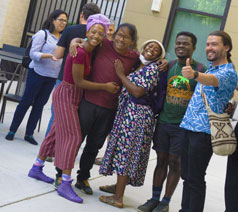Will Robots Feel Pain? The Politics of Race, the Governance of Technology, and the Future of Humanity
Event Start Date: April 23, 2021 2:00 PM
Event End Date: April 23, 2021 3:30 PM
.
Will Robots Feel Pain? The Politics of Race, the Governance of Technology, and the Future of Humanity
2:00pm Friday April 23rd, 2021
Reitz Union Rion Ballroom
*This talk is also the keynote of the UF Intersections Symposium and is currently planned as a live event. Please check back to see if the event will be moved online.
From Aristotle’s ancient conception of the soul, to Ibn Rushd’s 12th-century analytics of the intellect, to the information theory underlying neural networks, scholars have queried the agency of things and the relationship between matter and its other (spirit?). Does agency inhere in material things? Can an assemblage of machine parts be a person? What distinguishes humans from mere objects? In this talk, Sylvester Johnson proposes that the use of intelligent machines (in the form of artificial intelligence or machine-learning applications) for human enhancement has crystallized these age-old conundrums in a new key. Machines are now being successfully engineered to write poetry, compose music, make moral decisions, and even program other machines. More importantly, military efforts to combine humans with intelligent machines are beginning to produce far-reaching consequences that move beyond scenarios that pit mere humans against mere machines. By considering the racial history of so-called fetishism, Johnson gives historical depth to contemporary developments in cybernetics and discusses the prospect of new frameworks for humans and non-humans that may create new possibilities of machine life.
Sylvester A. Johnson is Assistant Vice Provost for the Humanities and Executive Director of the “Tech for Humanity” initiative at Virginia Tech. He is the founding director of Virginia Tech’s new Center for Humanities, which is supporting human-centered research and humanistic approaches to guide technology. Sylvester’s research has examined religion, race, and empire in the Atlantic world; religion and sexuality; national security practices; and the impact of intelligent machines and human enhancement on human identity and race governance. Johnson led an Artificial Intelligence project that developed a successful proof-of-concept machine learning application to ingest and analyze a humanities text. He is currently writing a book on human identity in an age of intelligent machines and human-machine symbiosis.







